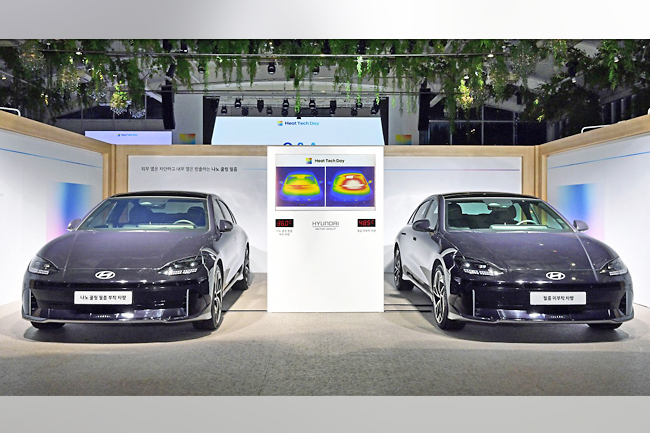ANN/THE KOREA HERALD – In the midst of South Korea’s record-breaking summer heat, Hyundai Motor Group held Heat Tech Day in Seoul yesterday, showcasing three cutting-edge climate control technologies designed to enhance passenger comfort in extreme temperatures.
The innovations include a nano-cooling film to lower cabin temperatures in summer, a radiant heating system for quick winter warmth, and metal-coated heated glass for rapid defrosting and improved energy efficiency.
These technologies are currently in the research and development stage and are not yet available for mass production.
Hyundai plans to integrate them into future vehicles, though the company has not disclosed a specific timeline.
The nano-cooling film can lower cabin temperatures by up to 10 degrees Celsius (oC), ensuring that vehicles remain cooler even after prolonged exposure to the sun.

Unlike conventional window tints, the nano-cooling film not only blocks external heat, but also dissipates internal heat.
At the event, Hyundai demonstrated the effectiveness of this film using two Hyundai Ioniq 6 test vehicles. The temperature difference between a model equipped with the nano-cooling film and one without it reached up to 12.5 degrees.
Comprising three layers – two that reflect near-infrared solar energy and one that releases interior heat – the film can also be combined with existing window tints without darkening the glass.
The nanotechnology has been adapted into other forms, such as fibres.
For instance, Korean archers competing at the 2024 Paris Olympics were provided with hats made from fibres embedded with the nano-cooling technology.
“In Korea, we plan to offer the nano-cooling film as an optional feature for new vehicles. In international markets, the film will be available through authorised Hyundai and Kia dealerships, with distribution handled by Hyundai Mobis, the group’s parts and services affiliate,” said principal researcher Lee Min-jae from the energy component research team.
For colder climates, Hyundai introduced a radiant heating system designed to quickly warm passengers. The system, which targets the lower body area, provides warmth within three minutes, offering a more comfortable alternative to traditional air vents that blow hot air.
When used alongside conventional heating systems, the radiant heating setup can reduce energy consumption by 17 per cent, a critical improvement for electric vehicles, where efficiency is paramount.



















































